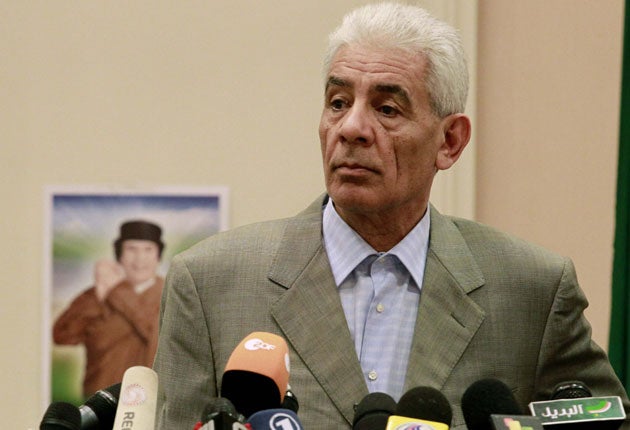Libyan foreign minister defects to Britain
Gaddafi aide arrives as UK expels five diplomats

Your support helps us to tell the story
From reproductive rights to climate change to Big Tech, The Independent is on the ground when the story is developing. Whether it's investigating the financials of Elon Musk's pro-Trump PAC or producing our latest documentary, 'The A Word', which shines a light on the American women fighting for reproductive rights, we know how important it is to parse out the facts from the messaging.
At such a critical moment in US history, we need reporters on the ground. Your donation allows us to keep sending journalists to speak to both sides of the story.
The Independent is trusted by Americans across the entire political spectrum. And unlike many other quality news outlets, we choose not to lock Americans out of our reporting and analysis with paywalls. We believe quality journalism should be available to everyone, paid for by those who can afford it.
Your support makes all the difference.Moussa Koussa, one of the most pivotal figures in Muammar Gaddafi's embattled regime, arrived in London last night after sensationally defecting and resigning his post as Libya's foreign minister.
The loss of the man who had run Libya's feared intelligence service, was a key architect of Libya's six-year-long rapprochement with the West and was often regarded – at least until last year – as the most influential government member outside the ruling family, is a serious blow to the Libyan leader.
The Foreign Office confirmed last night that Mr Koussa, who slipped into Tunisia at the beginning of the week on what was described as a "private visit" and reportedly left Tunis for Britain on a Swiss flight, was "no longer willing" to represent the Gaddafi regime.
The defection of the partly US-educated Mr Koussa, who is in his early sixties, cracks open the solidarity of a Libyan ruling elite which had largely held together since a cluster of political and military defections early in the crisis.
And it is a significant psychological boost for rebel groups in eastern Libya still reeling from the military reverse in the past 48 hours of the westwards advance they had earlier achieved in large part because of the coalition bombardment of pro-Gaddafi forces.
It follows a determined effort by the Libyan government to damp down speculation 24 hours earlier that Mr Koussa's trip presaged a defection. Khaled Kaim, one of Mr Koussa's two deputies, insisted to reporters on Tuesday evening that Mr Koussa was on "government business" and that he would be meeting his boss "shortly".
Mr Koussa's flight to Farnborough Airport came at the end of a day which had seen the expulsion of five Libyan diplomats from London because of fears that they were involved in plots to assassinate Libyan opposition leaders in London. Police and security services received intelligence that the Gaddafi regime had passed on orders through the Libyan embassy in Tunisia that prominent opponents of the regime should be "taken out" in London and Qatar.
The men, who include the military, cultural and finance attachés, were also alleged to have been involved in organising and supporting pro-Gaddafi factions in Britain. They are thought to have been under surveillance by MI5 for some time.
Downing Street said the expelled diplomats had "a very strong allegiance to the Gaddafi regime" and were known to have been "putting pressure on Libyan opposition and student groups in the UK". Each has a week to leave the country or lose their diplomatic immunity. A Foreign Office source said they were expected to travel to Tunisia.
Mr Koussa was expelled from Britain in 1980, when he was Tripoli's ambassador to London, for making clear the regime intended the assassination of two exiled Libyan dissidents living in the UK. But having been held by many Western intelligence officials as ultimately responsible for the Lockerbie bombing in 1988, he became the regime's main contact man in the talks which led to Libya, accepting responsibility for the bombing, paying large-scale compensation to its victims, and dismantling the country's nascent programme of Weapons of Mass Destruction. It was those talks that led to Tony Blair's famous "deal in the desert" with Colonel Gaddafi and opened the way to ending the now-resumed pariah status in which the country had been held.
On 18 March, the day after the UN Security Council vote sanctioning the international no-fly zone over Libya, Mr Koussa, who in the past acted as a mentor to Saif al-Islam Gaddafi, the Libyan's leader's second son, and in the past was seen as a reformist, appeared uncomfortable when he issued a statement promising a ceasefire, which was not in fact realised, and refused to answer questions.
The move follows the suggestion by Hillary Clinton, the US Secretary of State, that some senior Libyan officials had been "reaching out" to the West in an apparent search for a possible exit strategy or end to hostilities.
There was no immediate reaction from officials in Tripoli last night. Mr Kaim could not be reached for comment and Mousa Ibrahim, currently acting as the regime's foreign press spokesman, was locked in consultations in a room in the Rixos Hotel where most reporters are staying. A colleague said that a statement would be issued later.
Join our commenting forum
Join thought-provoking conversations, follow other Independent readers and see their replies
Comments